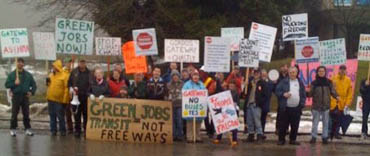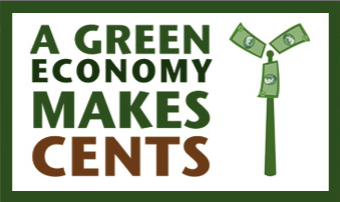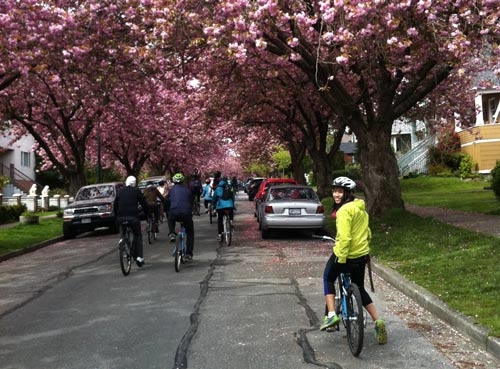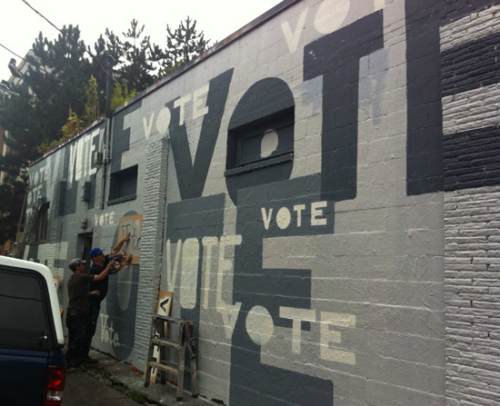Changing the course of the city and country: green jobs and transit now!

Last Monday’s anti-Gateway demonstration in Surrey; I’m in there somewhere! Photo from GatewaySucks.org
Stephen Rees’s blog has been bursting with exciting news lately, nearly every single post. When I say exciting, I don’t necessarily mean good, but the headlines do indicate multiple turning points in a potentially positive direction in what has so far been a steadfast plot on the part of our provincial and even federal government to proceed with Gateway.* At a time when gas prices have begun to increase once more, international shipping is declining, and peak oil is on the horizon, our provincial and federal governments are teaming up to build more roads and expand the port on the premise that it will create jobs. While I agree that creating jobs in British Columbia is of utmost importance, the economic benefits of redirecting funding toward building transit would more than double the number of jobs — and they would be local. That keeps BC money in BC. In fact, a study by the Canadian Urban Transit Association found that three times as many jobs are created in public transit as highways. Public transit encourages smart growth, reduces congestion and pollution (thereby making a grand step toward the Province’s 33% reduction in GHG goal), and has minimal environmental impacts.
Want to help steer the government away from highway jobs and construction to green jobs and transit, all across Canada? Here are some petitions and events happening right now:
PETITIONS
– Rail for the Valley: bring back passenger rail now
WRITE TO OUR POLITICIANS/MEDIA
– A Green Economy Makes Cents:
“On January 27, our federal government will introduce a new budget and invest billions of your tax dollars on stimulating the Canadian economy. Let’s make sure that as much of the stimulus package as possible is green.” Send a message to Finance Minister Jim Flaherty asking the government to invest in green jobs and green infrastructure. (David Suzuki Foundation)

Read my letter. (Americans can use the Wilderness Society’s page to send a letter to Congress on the same issue.)
– Make some noise for the Interurban:
“The Black Press newspaper chain is asking the question, “What is the number one project in your community that you feel would be most effective in helping improve local economic and social conditions?” Respond in 75 words or less, by either leaving a comment on one of their websites, or writing a Letter to the Editor of your local paper. With the federal budget now less than 2 weeks away (Jan. 27), it’s crucial that we push as hard as we can for re-establishing Interurban rail service as part of the big infrastructure spending stimulus the government is planning. Remember that upgrading the Interurban track so that passenger rail can run on it is a ‘shovel ready project.'”
WEDNESDAY Jan. 21
Resolved: Skytrain has run its course; LRT is the way to go. 7:30 – 9pm at Vancouver Public Library’s Alice McKay room (bottom level of VPL downtown at 350 West Georgia St, Vancouver). A debate between Patrick Condon (UBC Design Centre for Sustainability) and former premier Mike Harcourt. (Doors open at 7:15pm, seating for the first 300 only.)
THURSDAY Jan. 22nd
– No Gateway Bailout! protest. 12pm – 1pm, Offices of Macquarie Bank, 5 Bentall Centre (550 Burrard @ Dunsmuir, across from Burrard SkyTrain Stn.), Vancouver. [Facebook event]
– Friends of Rail For The Valley – gathering in Chilliwack. “This movement is about building a comprehensive rail and transit network for the entire Fraser Valley. And this Thursday is a great opportunity to get more involved.”
*Gateway is $2+ billion project to widen Highway 1 between Vancouver and Langley; to twin the Port Mann Bridge; and to build North and South Fraser Perimiter Roads. The consequences of Gateway include increased pollution, loss of key habitat and farmland, yet more urban sprawl, threats to Burns Bog, and health issues related to smog. It is a proven fact that widening roads leads to more congestion and traffic, not less, and therefore more pollution and deaths. “You cannot build your way out of congestion.”



